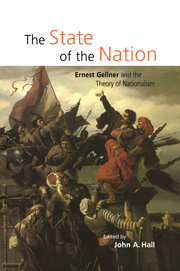Book contents
- Frontmatter
- Contents
- List of contributors
- Introduction
- Part I The making of the theory
- Part II The classical criticisms
- Part III Bringing politics back in
- Part IV Wider implications
- 10 Nationalism and civil society in central Europe: from Ruritania to the Carpathian Euroregion
- 11 From here to modernity: Ernest Gellner on nationalism and Islamic fundamentalism
- 12 Myths and misconceptions in the study of nationalism
- Bibliography of Ernest Gellner's writings on nationalism
- Index
12 - Myths and misconceptions in the study of nationalism
Published online by Cambridge University Press: 05 December 2011
- Frontmatter
- Contents
- List of contributors
- Introduction
- Part I The making of the theory
- Part II The classical criticisms
- Part III Bringing politics back in
- Part IV Wider implications
- 10 Nationalism and civil society in central Europe: from Ruritania to the Carpathian Euroregion
- 11 From here to modernity: Ernest Gellner on nationalism and Islamic fundamentalism
- 12 Myths and misconceptions in the study of nationalism
- Bibliography of Ernest Gellner's writings on nationalism
- Index
Summary
The resurgence of nationalism in eastern Europe and elsewhere in the last decade has sparked – with only the shortest of lags – an even stronger resurgence in the study of nationalism. As a certifiably ‘hot topic’, nationalism has moved rapidly from the front pages to the journal pages, from the periphery – often the distant periphery – to the centre of numerous scholarly fields and subfields. This new centrality is a mixed blessing. On the one hand, the robust demand for knowledge about – and ‘fixes’ for – nationalism brings new opportunities, resources and attention to the field. On the other hand, the rapid expansion of the field has strengthened analytically primitive currents in the study of nationalism, threatening to erode (or simply – given the volume of the new literature – to overwhelm) the analytical gains previously made in sophisticated works by Benedict Anderson, John Armstrong, John Breuilly, Ernest Gellner, Anthony Smith and a number of other scholars.
Borrowing Charles Tilly's phrase, this chapter addresses six ‘pernicious postulates’, six myths and misconceptions that, newly strengthened by the dizzying expansion in the literature and quasi-literature on the subject, inform, and misinform, the study of ethnicity and nationalism. Although I draw illustrative empirical material mainly from postcommunist east central Europe and the former Soviet Union, the theoretical debates I engage are central to the study of nationalism generally.
- Type
- Chapter
- Information
- The State of the NationErnest Gellner and the Theory of Nationalism, pp. 272 - 306Publisher: Cambridge University PressPrint publication year: 1998
- 96
- Cited by

